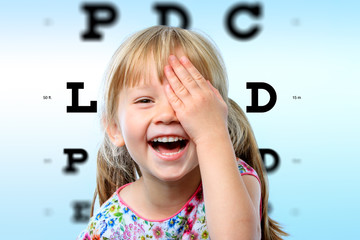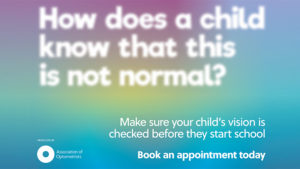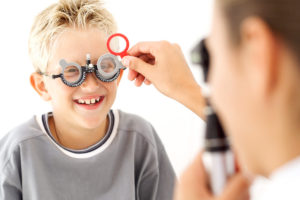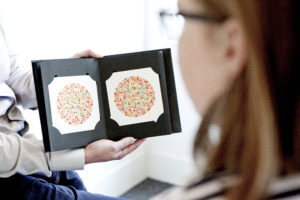
Good eyesight is crucial in making sure a child develops to their full potential both at school and socially. It’s especially important to look after children’s eyes – the eye is still developing throughout childhood so if problems are treated early, it can make a lasting difference. Yet research shows that around 20% of school-aged children have an undiagnosed vision problem. It’s never too soon to have a sight test, visiting an Optometrist will mean you can spot and manage vision problems that may affect your child’s development.

At Chipping Norton Opticians we have specific tests for measuring children’s vision. We use test charts that can change depending on the child’s age and ability. Pictures are typically used for pre-school children so don’t worry if letters are not yet recognised.
Kimberley and Chris have three young children of their own and this helps with understanding and helping children of different ages.

How do I know if my child has an eye problem?
Some eye conditions do not display any signs or symptoms, so the only way to know for sure is to take your child for a sight test. Signs which may show there is a problem with a child’s sight include:
- An eye appearing to drift inwards or outwards
- Difficulty concentrating
- Behavioural problems
- Headaches
- Sitting too close to the television
- Frequent eye rubbing
- Screwing the eyes up
Symptoms of a vision problem
This could mean your child needs glasses or that they have an eye that is healthy but does not see as well, otherwise known as a ‘lazy eye’. The condition can run in the family, so if a relative has either an eye turn (squint) or suffers from reduced vision in one or both eyes (amblyopia), it’s a good idea to take any related children for a sight test.
What is vision screening?
Some children have their vision screened at school – this is usually a basic test, designed to pick up children who have reduced vision in one or both eyes. If a problem is suspected, children will usually be referred to an optometrist for a full sight test. Parents may assume that their child has been screened at school but this does not happen in all areas of the country. Even where this does happen, it is not usually until the age of four or five, so we recommend that all children visit their optometrist for a sight test around the age of three.
What is a sight test?
A sight test is a comprehensive check which can pick up many other conditions, including colour vision defects, problems with the development of 3D vision and any need for glasses.

When should my child visit you?
Although the UK National Screening Committee recommends screening at age four to five years, there are many optometrists who will see children much younger than this for a sight test. We recommend that children have a sight test around the age of three, so that conditions are picked up and treated early. After the first test it is a good idea to return every two years, or as we advise.
Do I pay for my child’s sight test?
Children under the age of 16 are entitled to NHS-funded sight tests (covering the cost of a sight test), plus an optical voucher, helping towards the cost of glasses or contact lenses if required.
What can I do if I don’t want my child to wear glasses?
If you’re reluctant for your child to wear glasses, it’s important to remember that some children need a visual correction in order for their vision to develop normally and to achieve their full potential. The good news is, there is now a much wider range of attractive frames to choose from and less stigma attached to wearing glasses. Some children may even be disappointed when told they don’t need to wear glasses.
Many children are also suitable for contact lenses; this is particularly helpful for children who take part in regular sports activities and can be successfully worn from an earlier age than you might expect. Ask us whether contact lenses would be suitable for your child.
What else can I do to look after my child’s eyes?
- Get them outdoors – regular play and exercise can help with eye health. Studies show two hours of outdoor activity a day is ideal for healthy eyes.
- Make sure they eat healthily and drink enough fluids
- Protect their eyes from the sun – never let them look directly into the sun and make sure they always wear good-quality sunglasses with the ‘CE’ quality mark and the British Standard BS EN 1836:2005.

